As the House of Commons remains virtually deadlocked over its order for the government to hand over documents related to a green technology foundation, some MPs are commenting on the chances of the prime minister proroguing Parliament to break the impasse.
Prorogation would end the current session of Parliament early, meaning MPs are released from duties, no committees can sit, and all bills that have not received royal assent are “terminated” and must be reintroduced in the new session as if they had never existed.





